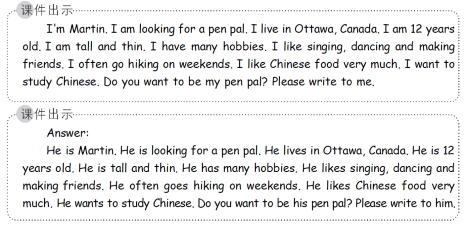人教pep六上英语 Unit 4 The sixth period第六课时教案
The sixth period(第六课时)
Part B Let’s check & Let’s wrap it up &
Part C Story time ![]()
▶教学内容与目标
课时教学内容 | 课时教学目标 |
Let’s check | ·能够完成Let’s check板块的语篇听力训练,巩固本单元所学重点内容 ·能够学会从图片信息中推测考查点,做到有目的地去听录音,听后完成判断任务 ·培养学生良好的听力习惯,有策略地提高学生的听力水平 |
Let’s wrap it up | ·能够通过图配文的方式帮助学生理解一般现在时第三人称单数形式,并通过使用找关键词进行词尾转换的方式,帮助学生归纳本单元主要语法现象 ·能够在教师的引导下,启发思维,学会总结 |
Story time | ·能够通过阅读趣味故事,复习巩固本单元所学语言,增加语言输入 |
▶教学重点
能够复习并巩固本单元所学的核心单词、词组和句型。
▶教学难点
能够在教师的引导下,启发思维,学会巩固复习和归纳总结。
▶教学准备
PPT课件、课文录音、视频等。
 ▶教学过程
▶教学过程
1
Step 1: Warm-up & Revision & Lead-in
1. Greetings. Greet students. Divide them into several groups and tell them, “If you can join actively, response quickly, and be open-minded in class, your group can get more points. The group which gets the most points will be the winner.”
2. A quick review. (课件出示:图片和词组)
T: Let’s get a quick review. How many hobbies can you name in these five columns: sports, art, music, outdoor activities, indoor activities? If you can name one, you’ll get one point for your group. (课件出示:以分类形式呈现的爱好相关的词汇)
3. Free talk.
Talk with students about their own, their parents’ or their friends’ hobbies.
Step 2: Presentation & Practice
1. “Let’s check”.
(1) Make predictions.
 Present the pictures of “Let’s check”. (课件出示:教材P44 Let’s check板块的图片) Lead students to go over the pictures and predict the content they are going to listen.
Present the pictures of “Let’s check”. (课件出示:教材P44 Let’s check板块的图片) Lead students to go over the pictures and predict the content they are going to listen.
T: In the dialogues, we are going to talk about four people. They are Andy, Mike, Amy and John’s mother. What are the dialogues going to talk about?
Ss: The dialogues are going to talk about their hobbies.
T: Nice guess. What are their hobbies from Dialogue 1 to Dialogue 4?
S1: In Dialogue 1, he likes playing football or the piano.
S2: In Dialogue 2, he likes going by bus or by bike.
S3: In Dialogue 3, she likes doing word puzzles or reading stories.
S4: In Dialogue 4, she likes watching news or cooking.
T: Good job! Let’s see whether we get the right guess.
(2) Listen and tick.
Play the recording. (课件出示:教材P44 Let\'s check板块的音频)
Lead students to listen to it and tick the correct pictures. Then check the answers.(课件出示:教材P44 Listen and tick的答案)
(3) Listen again and fill in the blanks.
 Try to fill in the blanks according to the pictures before listening. Listen again and complete the sentences. Check the answers after listening.(课件出示:教材P44 Listen again and fill in the blanks的内容及答案)
Try to fill in the blanks according to the pictures before listening. Listen again and complete the sentences. Check the answers after listening.(课件出示:教材P44 Listen again and fill in the blanks的内容及答案)
(4) Present the listening materials and let students read the text together. (课件出示:教材P44 Let’s check板块的听力材料)
2. “Let’s wrap it up”. (出示课件)
(1) Let students observe the picture in the book and then read the passage and underline the verbs. Then lead them to fill in the blanks. Check the answers together.
(2) Work in groups. Discuss about the regulations of these verbs. Lead students to put them into different groups and find out more words like these.
Write down the changing rules of verbs following the singular third person on the blackboard. Present the rules on the PPT.(课件出示:动词第三人称单数形式的变化规则)
(3)T: How do we use these verbs?
Ss: We use them after the singular third person in the simple present tense. (Students can answer in Chinese.)
T: Excellent! Here is a short passage written in the first person. Can you change it into the third person?
Ss: Yes!
T: Great! Let’s have a try.

 Step 3: Consolidation & Extension
Step 3: Consolidation & Extension
1. “Story time”.
(1) Know the main characters and the main idea of the story.
T: What does the squirrel look like?
Ss: It is cute. It has got a big and long tail.
T: Yes. Let’s get into the story and see what the story talks about the squirrel.
Watch the video of “Story time”. (课件出示:教材P45 Story time板块的视频) Get the main idea.
 T: What does the story talk about the squirrel?
T: What does the story talk about the squirrel?
Ss: It talks about the squirrel’s bushy tail.
(2) Circle the verbs in the simple present tense.
Ask students to read the story as fast as they can and circle the verbs in the simple present tense.
Lead students to have a basic understanding of the simple present tense.
(3) Read and answer the questions.
Ask students to read the story carefully and try to get a better understanding. Let them think about these questions and underline the answers while reading.
①What is the Monkey King’s hobby?(The Monkey King likes reading books.)
②What is Zac’s hobby?(He likes singing and dancing very much.)
③Why was the Monkey King so angry?(He doesn’t like Zac’s music. One day, Zac sang for the king. The king was very angry.)
T: So, how does the squirrel’s tail get bushy?
Ss: The king shouted, “Go away!” Then he threw Zac out of the tree. From that day on, all squirrels’ tails were bushy.
T: Is it a true story?
Ss: …
 (4)Read the story.
(4)Read the story.
①Read the story after the recording. Imitate the pronunciation and the intonation.
②Practice in groups. Choose a short part to perform the story.
③Ask several students to come to the front of the classroom and act out the story.
2. Summary.
Make a brief summary according to the blackboard design. Evaluate students’ group work and select the best group.
1
▶板书设计

▶作业设计
Remember the key words and sentence structures
▶教学反思
1. 利用快速复习的方式,激活学生相关词汇和本单元的背景知识。复习之前先让学生回忆和总结,不仅能帮助学生唤醒旧知,还能使他们在下面的学习中更有针对性地复习并牢记被遗忘的知识。
2.教学活动设计循序渐进,以学生为主体,注重小组合作与交流探究,引导和启发学生思维,培养学生的自主学习能力和思维能力。
3.教学活动设计由词逐句,由句步入篇章,引导学生关注语言细节,复习和巩固本单元的核心语法点,提高语言表达的准确度。
4.通过学习故事,丰富语言输入,拓展本单元主题的相关表达,了解松鼠尾巴变蓬松的趣味故事。
![]()
▶Teaching Contents & Teaching Aims
Let’s check
·Be able to complete the listening exercises in “Let’s check” and consolidate the key words and sentence structures in this unit.
·Be able to predict the test points through pictures, and try to listen to the recording with purpose, then complete the exercises.
·Develop students’ good listening habits, and strategically improve their listening level.
Let’s wrap it up
·Be able to understand the usage of the singular third person in simple present tense. And be able to summarize the main grammatical phenomenon in this unit.
·Be able to inspire thinking and learn to summarize under the teacher’s guidance..
Story time
·Be able to review the key expressions of this unit and enrich the language input through reading the story.
▶Teaching Priorities
·Be able to review and consolidate the key words, phrases and sentence structures of this unit.
▶Teaching Difficulties
·Be able to inspire thinking and learn to consolidate and summarize under the teacher’s guidance.
▶Teaching Procedures
Teaching Stages | Teacher’ s Activities | Students Activities | Teaching Purposes |
Warm-up & Revision & Lead-in | 1. Greetings. Greet students. Divide them into several groups. | Greet the teacher. Acquire the evaluation rules of group work. | Set up an evaluation mechanism. |
2. A quick review. Lead students to review the words of the hobbies in this unit. | Get a quick review of the words of the hobbies in this unit. | Review the key vocabulary and sentence structures of this unit. Lay the vocabulary and sentence foundation for the following review activities. | |
3. Free talk. Talk with students about their own,their parents’ or friends’ hobbies. | Talk with the teacher about their own, their parents’ or their friends’ hobbies. | ||
Presentation & Practice | 1. “Let’s check”. (1) Present the pictures of “Let’s check”. Lead students to go over the pictures and predict the content. (2) Play the recording. Lead students to listen and tick the correct pictures. Then check the answers. (3) Play the recording again. Lead students to complete the sentences. Check the answers after listening. (4) Present the listening materials. | (1) Go over the pictures and make predictions. (2) Listen and tick. Check the answers. (3) Fill in the blanks before listening. Listen again and complete the sentences. (4) Read the listening materials together. | Lead students to observe the pictures one by one, and learn to infer the test points. Predict the content of the listening text, so as to listen purposefully. Cultivate students’ good listening habits, in order to continuously improve their listening level. |
2. “Let’s wrap it up”. (1)Lead students to complete the exercise in “Let’s wrap it up”. (2)Ask students to work in groups and discuss about the regulations of the verbs. (3)Teach how to use the verbs. | (1) Read the passage and underline the verbs. Then fill in the blanks. (2) Work in groups. Discuss about the regulations of these verbs. Put them into different groups and find out more words like these. (3) Learn to use the words. | Help students understand the meaning of the short passage through the picture. Lead them to observe the verb forms, and summarize the main grammatical phenomenon in this unit. Learn the singular third person in the simple present tense. | |
Consolidation & Extension | 1. “Story time”. (1) Lead students to watch the video of “Story time” and know the main characters and get the main idea. (2) Teach the verbs in the simple present tense. (3) Ask students to read the story and answer the questions. (4) Let students practice reading the story and act out. | (1) Watch the video of “Story time”. Know the main characters and get the main idea. (2) Circle the verbs in the simple present tense. (3) Read and answer the questions. Read the story carefully and get a better understanding and answer the questions. (4)①Read the story. ②Practice in groups. ③Act out. | Watch the video of the story, get an overall perception of the story, and grasp the main idea. Review the simple present tense. Help students deeply understand the text and consolidate the key sentence structures of this unit. Make sure students can read the story correctly. |
2. Summary. | Have an overview of the class according to the blackboard design. | Enrich students’ language expressions, and increase the language input related to the unit topic. | |
Homework | 1. Remember the key words and sentence structures. 2. Do the exercises. | ||
1
